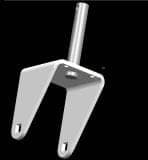
Curated with aloha by
Ted Mooney, P.E. RET

The authoritative public forum
for Metal Finishing 1989-2025

-----
What plating will not cause hydrogen embrittlement when welded?
December 15, 2008
I have a caster assembly that consists of a 1215 steel shaft welded into a 1008 sheet metal bracket that holds the wheel. The shaft is masked and the bracket end is then painted. The shaft is not painted because it must fit through bushings. So we're looking for a plating for the supplier to use on the shaft that will not cause hydrogen embrittlement when it is welded to the bracket. We cannot plate the entire assembly after welding because it would require the welded assembly to be shipped out since we don't plate in-house and that adds cost. Is hydrogen embrittlement even an issue since neither component is high strength steel?

Thanks.
Alex Borshovengineer - Cleveland, Ohio, USA
December 16, 2008
Hi, Alex. You've got it: it's not a problem since neither component is high strength steel.
Regards,

Ted Mooney, P.E.
Striving to live Aloha
finishing.com - Pine Beach, New Jersey
Alex, Ted is spot-on. But your letter reveals a misunderstanding about hydrogen embrittlement.
It is not the case that some plating materials cause hydrogen embrittlement when the plated object is subsequently welded whereas some other plating materials don't (we're talking electroplating here).
It is the case that the plating process itself causes hydrogen embrittlement in susceptible materials, whatever metal is deposited, and the embrittlement is there from the moment the plating process finishes, whether or not the item is subsequently welded.

Bill Reynolds [deceased]
consultant metallurgist - Ballarat, Victoria, Australia
We sadly relate the news that Bill passed away on Jan. 29, 2010.
December 18, 2008
I fully agree with Ted's opinion. HE is a concern only in high strength steels. Maybe what you should focus is the kind of welding process that will plate satisfactorily.
G. Marrufo-Mexico
Monterrey, NL, Mexico
December 19, 2008
January 26, 2009
Dear,
You will never face such kind of problem when hardness of the component is less than 25 to 30 RC.
Answer is in your question only.
- Rajkot (Gujarat) - INDIA
Q, A, or Comment on THIS thread -or- Start a NEW Thread